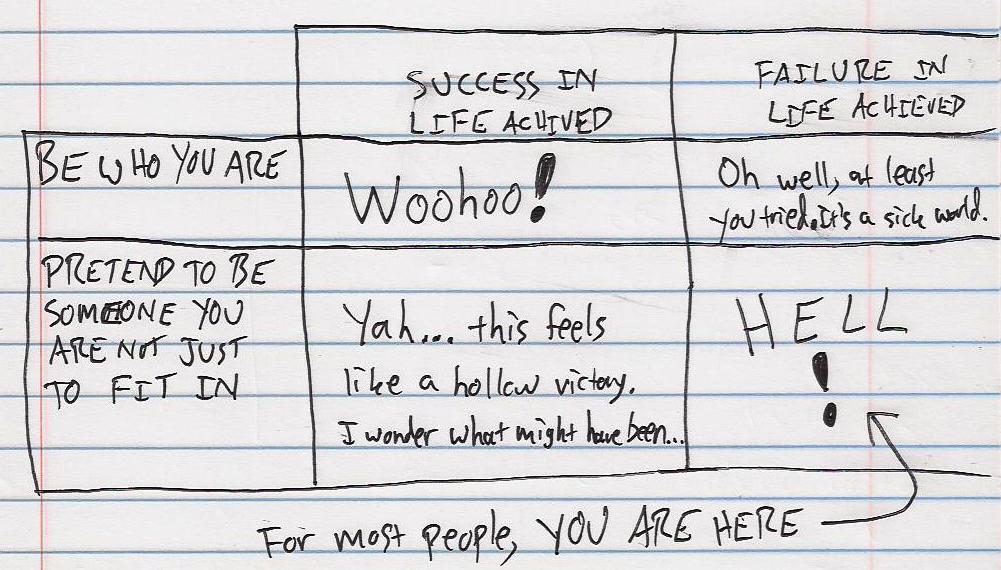
In the wake of the Newtown shooting there has been a lot of talk about needing to open up the conversation about mental illness. As I started listening to the coverage and conversations I started to get peeved at how the term was being thrown around as if it encapsulated every mental state that may have a negative connotation. As an artist and metalhead it also brings to light the necessity to get clear about the stereotypes associated with being a “creative type”.
When I started to write SuperHappyMelancholyexpialidocious I wanted to talk about my own struggle with episodic depression and search for joy, but to do it in a way that was relatable and avoid the journal-entry-as-theater cringe fest that one can easily fall into. As I researched the various organizations that I could potentially work with in regards to mental health I’ve been consistently weary about 80% of their mission statements.
Can you be more vague please?
We represent the wide spectrum of mental illness that is present in the United States and we aim to serve that population through a combination of research and outreach. That’s fairly vague and even somewhat boring to me mainly because it isn’t specific enough. Who exactly are you serving and why?
There are so many types of mental illness and severity associated with each kind that casually labeling someone manic depressive, bi-polar or autistic seems quite unhelpful. Not that I haven’t put people in these boxes without knowing if the classification is even DSM worthy. Yeah he’s kind of aspergery. What does that even mean exactly? Just because someone is a bit socially inept does it mean they need to be on meds or is it simply that I just don’t like being in their company?
Oh, don’t worry, that’s because I have Antisocial Personality Disorder
We throw around OCD to describe our need to keep our car clean in a particular way. When I was kid everyone started to have ADD or ADHD. Most likely most of the “cases” were based on an overconsumption of sugar and lack of physical activity. For years, while I was flailing about in the bay area trying to figure myself out, I was wondering if I had a disorder of some kind. I was both wanting to be put in a box while also fearing the lid being stapled down on me.
Although diagnosis is a helpful it’s usually for the benefit of others and not for the person who is being examined. Oh, that’s why he’s like that. That makes so much sense. It seems as if we are able to categorize each other, then we know where we stand and can be prepared for the worst. On the other hand mental illness has been a celebrated component of the artistic life.
He’s only acting out because he’s so creative
The artists who historically get the most press are the ones who seem the wackiest, the most outlandish, bordering on uncontrollable. We have a fascination with the musician who takes out a knife onstage and starts cutting himself mid-song. We’re drawn to the topsy-turvy hatefucks that seem to fuel the fury of the abstract painter. The writer whose sullen introverted ways lead to volumes of unpublished prose sitting next to a suicide note.
Doom Metal = Gun Violence (Really?)
The romanticism with mental anguish is just as troubling as the need to blame Marilyn Manson for the Columbine tragedy. If we are truly going to have an open dialogue about mental illness then perhaps we need to stop using that term entirely. Is it possible to find a neutral terrain that incorporates all of the possible unknowns as well as the research that has been done up to this point? Can the community of concerned citizens and mental health professionals come together to create a clarity about what it is we’re really trying to achieve?
Answer me this
In terms of art, can we let the art stand on it’s own but hold the person who has created it accountable for their actions in society, rather than celebrating their preciousness as a cultural influencer? Can we see illness for what it is? A need to create more ease for that individual, lifting away a particular stigma while simultaneously assisting them in taking responsibility for what they are capable of.
There is a benefit in coming to terms with one’s own limitations and needs, finding a balance to how one operates in the world at an optimum level. The thing that is clear to me is that this cannot be done alone, that labels are generally cop-outs and that the territory of the brain and it’s relationship to illness is just beginning to be unraveled. It’s better for us all to be in a deep state of questioning rather than thinking we have a solid argument or answers.